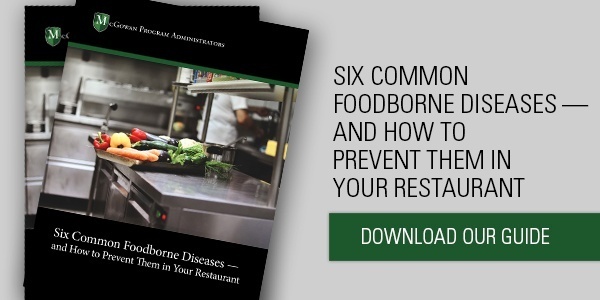Eating out is one America’s favorite past times. No matter if it’s a fancy dinner with loved ones or a quick burger after a long day, restaurants are part of the cultural and social landscape of the country. The latest data from Rasmussen Reports noted that 58 percent of Americans eat out at least once a week. In addition, not only are people frequenting dining establishments more regularly, but for the first time ever, sales at restaurants and bars have surpassed grocery store sales, Bloomberg reported.
However, recent outbreaks of contaminated food, such as the one that rattled Chipotle stores across the country, have caused a stir of concern across the hospitality industry. According to the Centers for Disease Control and Prevention, two separate outbreaks of E. coli infected 60 people from 14 different states.
“One in six people in the country get sick from eating contaminated food each year.”
Each year, roughly 48 million Americans, or nearly one out of every six people in the country, get sick from eating contaminated food, according to the CDC. Food-related diseases cause approximately 128,000 hospitalizations and 3,000 deaths annually. Although the Chipotle case represented a fraction of the yearly sicknesses and deaths that arise each year due to foodborne outbreaks and infections, the fast casual Mexican restaurant provides several lessons for hospitality industry professionals and the brokers and agents that insures them.
Although brokers and agents don’t have the time or luxury to remain on-site at all the restaurants they insure to guarantee employees follow proper safety precautions at all times, there are ways to assist these establishments.
Hold a companywide team meeting
Brokers and agents insuring restaurants should encourage their clients to carve out a few hours and hold a companywide team meeting to address safety concerns. This is exactly what Chipotle did after executives learned of the outbreak, CNBC reported.
Gathering everyone together to talk about health and safety protocols ensures everybody is on the same page with this important topics and bridges any gaps in a single person’s understanding of his or her responsibilities. This also provides a forum for any questions or concerns someone might have but were afraid to ask.
 Bringing the entire staff together for a health and safety training session can help reduce instances of food contamination.
Bringing the entire staff together for a health and safety training session can help reduce instances of food contamination.Bring in the professionals
No matter if someone is running a food truck, a catering company or a franchise’s string of fast-food shops, all employees who handle the food should have the proper safety training. Whether it’s cross-contamination from infected meats or produce to cooks not effectively washing their hands, too often the culprit for foodborne outbreaks stems from human activity.
While the vast majority of insurance brokers and agents will not have this sort of specific industry expertise to provide food safety certifications, it can be a good idea to find ways to partner with professional training consultants that can work with the restaurants. With increased access to food safety sessions, restaurants can greatly reduce their chances of a sick customer coming back with a lawsuit.
Consider offering sick days
Although providing sick leave is not always financially feasible or ideal for a restaurant, it can ultimately prevent worse damages down the road. Often, without the option to call in sick whether due to a risk of being fired or being unable to afford to take a day off, people will come to work with a cough or a flu that could potentially jump to a customer.
Chipotle representatives claimed sick employees were to blame for the two outbreaks, CNBC reported. The company went on to implement a paid sick leave policy to avoid ill workers from contaminating food.
Brokers and agents should talk to owners and managers about the need to implement policies for allowing employees to stay home sick. This doesn’t necessarily need to include paid time off, but it could be providing greater leniency. Requiring a doctor’s note can still keep workers from abusing the system.
Offer incentives
Another tactic Chipotle will now be implementing is handing out bonuses for restaurants that meet or exceed food safety measures. Smaller diners or fast-food shops can offer rewards or other incentives to motivate employees who properly follow internal policies for food storage and preparation or cleaning. This could be anything, such as offering a day off work, a gift card or a special award.
Download: Restaurant Package Insurance Application
Protecting the bottom line
Despite including food safety training and implementing policies designed to combat outbreaks, the simple fact remains that these risks are still all too unavoidable. While owners and employees can take steps to mitigate their exposure to foodborne diseases infecting their food, sometimes circumstances beyond their control, such as contamination in the supply chain, can cause customers to become sick or worse. Because of this, it’s important that restaurants have the right insurance in place to protect their bottom line when they need it most.
Brokers who partner with McGowan Program Administrators gain access our “Power of the Pen.” This allows us to uniquely tailor coverage specifically for a wide variety of food service establishments.



